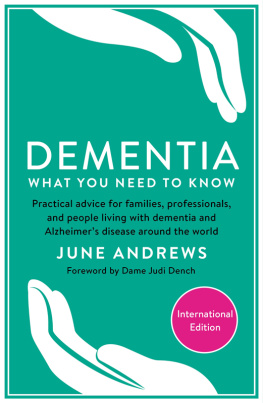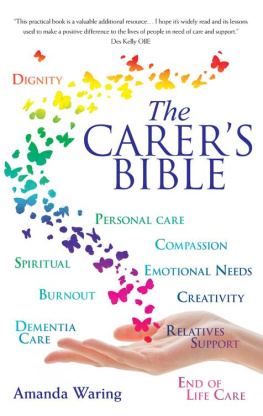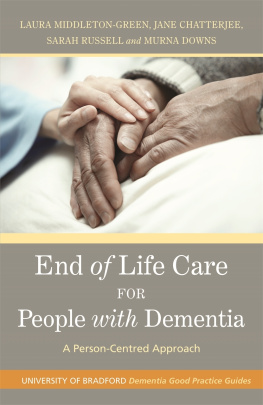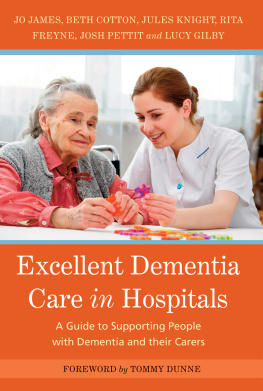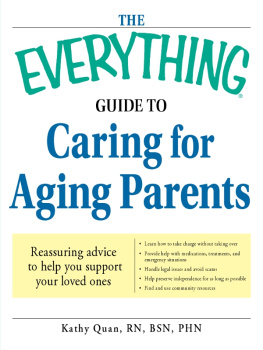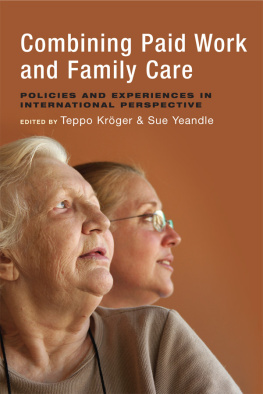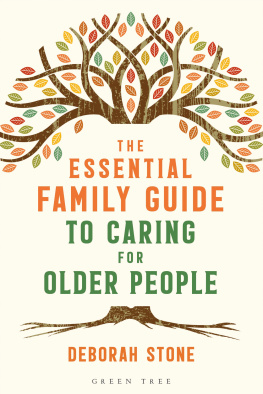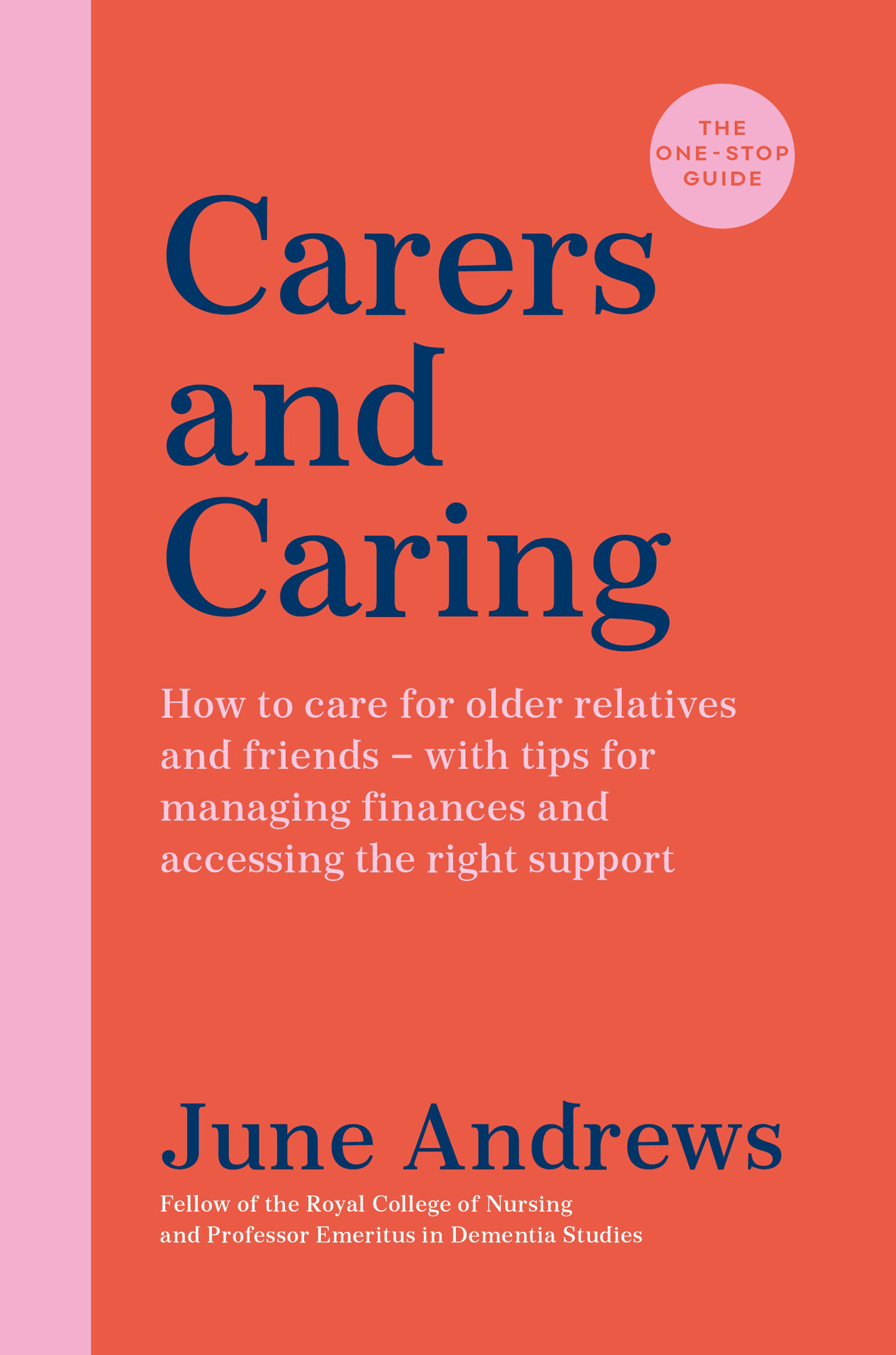Contents
Guide
Carers and Caring
THE ONE - STOP GUIDE
June Andrews is a dementia specialist adviser and Professor Emeritus in Dementia Studies. She is a Fellow of the Royal College of Nursing, the highest honour awarded to nurses in the UK and in 2016 was awarded the OBE. June advises families, organisations and governments across the world. She is also author of Care Homes: The One-Stop Guide and Dementia: The One-Stop Guide, which have sold 44,000 copies and feature in an online training programme for family carers and care workers.
Follow her @profjuneandrews on Twitter
and www.juneandrews.net
ALSO BY JUNE ANDREWS
Care Homes: The One-Stop Guide
(Souvenir Press, 2020)
Dementia: The One-Stop Guide: Updated Edition
(Souvenir Press, 2020)
10 Helpful Hints for Carers
(with Allan House, University of Stirling, 2009)
When Someone You Know Has Dementia
(Greystone Books, 2016)
Dementia: What You Need to Know
(Profile Books, International Edition, 2016)
Demencja: Kompleksowy przewodnik po chorobie
(Harmonia Universalis, 2015)
Carers and Caring
THE ONE - STOP GUIDE
How to care for older relatives and friends with tips for managing finances and accessing the right support
June Andrews

First published in Great Britain in 2022 by
Souvenir Press,
an imprint of Profile Books Ltd
29 Cloth Fair
London
EC1A 7JQ
www.souvenirpress.co.uk
Copyright June Andrews, 2022
10 9 8 7 6 5 4 3 2 1
Typeset in Dante by MacGuru Ltd
The moral right of the author has been asserted.
All rights reserved. Without limiting the rights under copyright reserved above, no part of this publication may be reproduced, stored or introduced into a retrieval system, or transmitted, in any form or by any means (electronic, mechanical, photocopying, recording or otherwise), without the prior written permission of both the copyright owner and the publisher of this book.
A CIP catalogue record for this book is available from the British Library.
ISBN 978 1 80081 000 6
eISBN 978 1 78283 960 6
Dedicated to Sonia Mangan, who has taught me so much about caring and being a carer, and that you must allow yourself to be cared about.
Introduction
Who is a carer?
To those people who have a relative or friend that they care for, it might seem odd that this is even a question. It needs to be asked for two reasons. First, because sometimes the people who are paid to care for another person as part of their job are also sometimes called carers. And second, because family and friends who do caring work often say that they are not carers. The position is very different between, on the one hand, those who work with older people as their job and, on the other hand, family and friends who are caring for someone. Sometimes also known as informal carers or unpaid carers or even family carers, the carers in focus in this book are people who provide care as an act of love, loyalty, duty, kindness or even by accident looking after an ill, older or disabled family member, friend, partner or someone in their community. It may be a few hours a week or round the clock every day, in their own home or from a distance. It may be temporary or for the rest of the life of the carer, or the person cared for. To make things as clear as possible in these pages I will always talk about nurses, social workers, home helps, care assistants and other people who care for their living as care workers. Only friends, neighbours, family and partners will be described as carers throughout this book.
You may be a family member or friend who rejects the idea of being called a carer.
I am NOT her carer. I am her HUSBAND. (Older man at a carers support meeting)
Having been her husband for forty years, this man doesnt like anyone coming along and defining their relationship and labelling the ordinary acts of his daily life as care. Anyone can understand why he objects to being branded like this. But here is a signal throughout this book you will see advantages of allowing others to call you a carer. Because what others say doesnt change your relationship, you may as well allow them to use this label. This is because a lot of the outside help that is on offer is only available to anyone defined as a carer. Obvious examples are when health and social services talk about Carers Allowance and carers rights. The language used in their regulations, laws and administration is an imposition, but it is vital to you and to the one you are caring for to take any help that is labelled in this way. It opens the door to a range of rights and possible benefits. Anything you can do to maintain your fundamental role and position as husband, daughter, wife, son, friend, neighbour or relative is important to you and the person you care for, but if you allow yourself to be known in addition as their carer, it just makes your life easier. No one likes being put in a box, but there is a good reason to be pragmatic about this definition.
About this book
Who needs this book? Carers, as defined. The aim is to save you time and reduce the cost of caring by advising on common problems and ways round the system, and sources of help. Carers need practical advice that is easy to read and based on experience and evidence. Some official processes are complicated and look like they were devised and written by a person who has never actually had to care. It can take time to search for answers, being referred from pillar to post, when dealing with health and social care processes.
The focus here is on those carers who are caring for older, frailer people. Many of the problems are similar for people who care for younger people, people with complex health needs or children, but there are very important differences which are not the main subject of this book and cannot be covered here. However, the Useful Contacts and Resources section contains links to resources for carers on a range of conditions that impact throughout life, and these also highlight resources that might help parents and others who are carers for children and young people.
Caring can be a joy and a privilege. Its part of human life to care for others, and for many people the involvement is a source of great happiness. Being close to the person you care for, expressing love and making them comfortable and happy is a wonderful experience. Especially in old age and towards the end of life it is a chance to give back to people who have given of themselves all their lives. If you are having such a wonderful experience, some of the things in this book will seem antagonistic. This is because the book is about helping, and the focus is on where things have gone wrong, are difficult, or could be made better. This is not to suggest that caring is always tough. The Joy of Caring is maybe the next book for me to write. Highlighting and offering solutions to the tough stuff is intended to make your caring experience less difficult now, allowing more space for the joyful stuff.
A lot of the time, when you are a family or friendship carer, some aspects of life will not have changed from how it was before you were caring. You are living with or caring for the same person that you have always known. You know the sort of thing that makes them happy and relaxed. You have a shared history. You also know what will upset them and even set them off on a negative way of thinking or responding. You are the expert on this person and how they live. But even an expert needs some fresh ideas occasionally.


